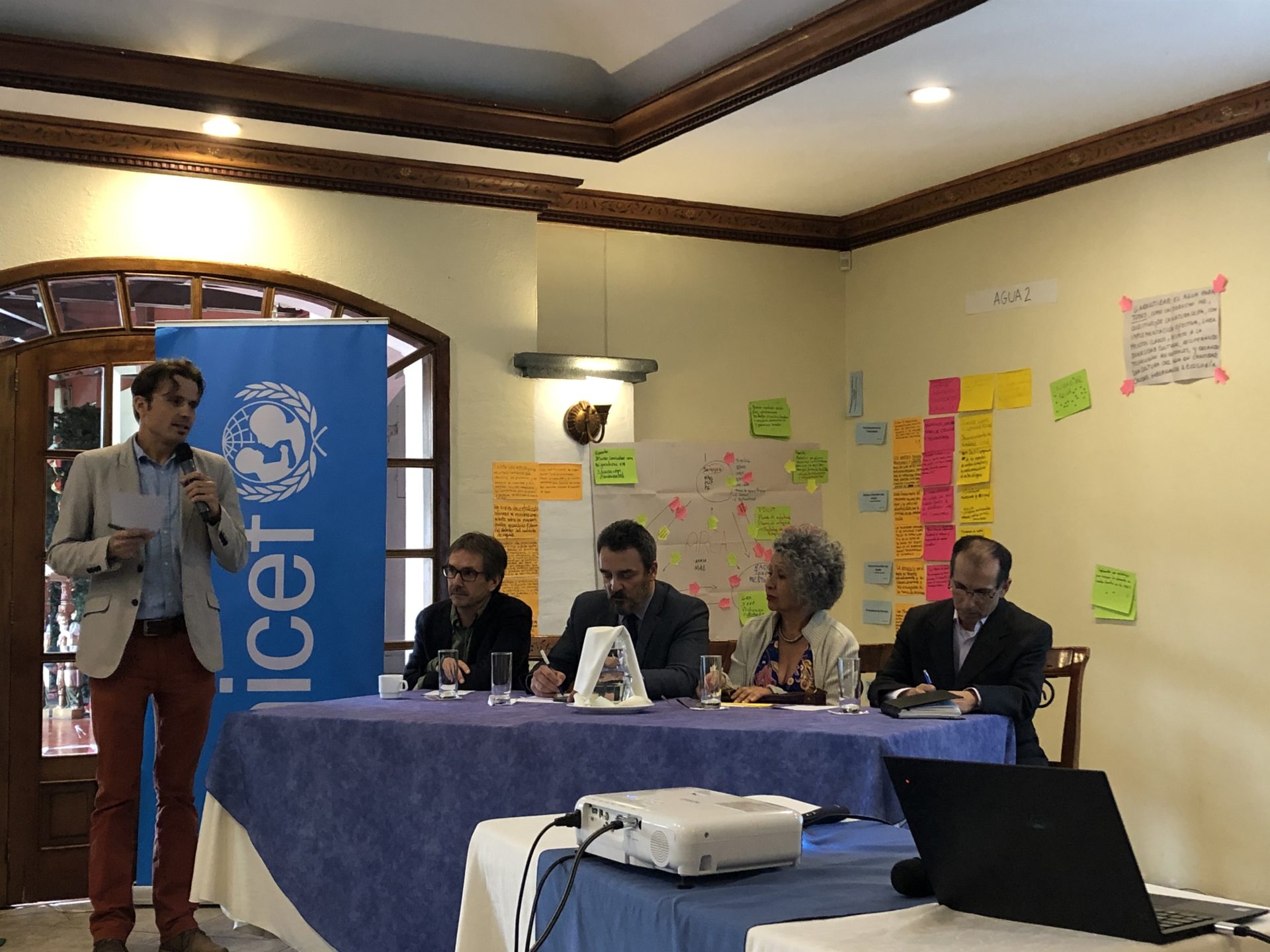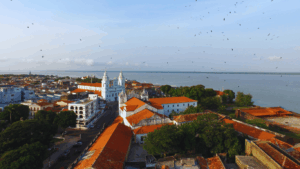Ecuador evaluated bottlenecks on rural WASH, integrating a perspective in climate change and the Rights of Nature
With the objective of improving water governance in the rural sector of Ecuador, WASH governance experts were invited by UNICEF to facilitate a WASH bottleneck analysis in Puembo, a rural parish of the Metropolitan District of Quito. The aim of the WASHBAT is to elevate the efficiency of WASH sector resources to achieve more sustainable and equitable outcomes. This is achieved through facilitating dialogue between stakeholders leading to offering practical proposals to remove barriers and increase sector development.
Ecuador was the first country to recognize the Rights of Nature in its Constitution in 2008, institutionalizing the inalienable rights of Pachamama (Mother Earth) – where life is realized and reproduced- to have its existence integrally respected, and the maintenance and regeneration of its vital cycles, structure, functions and evolutionary processes. One part of the WASHBAT exercise focused on assessing the extent to which the implementation of WASH strategies respects or not these rights. The conclusion was that it does not, as there is no focus on source protection or in assuring a sustainable use of underground water or any control in waste water discharge.
In terms of the integration of Climate Change into the methodology, SIWI developed a methodology where all Climate Change criteria (specifically developed for the Ecuadorian workshop) would be assessed in a first step. As a second step, the climate change experts invited to the workshop would merge into the teams working in water, in sanitation or in WASH in schools, in order to assure that the criteria prioritized was well understood. In this manner, we tried to bridge the traditional gap between the WASH and climate change views, rules, regulations and implementation of programs.
The methodology proved to be successful, as in the conclusions for the prioritized activities, most of them have a component on climate change and the rights of nature.
In Ecuador, the provision of water and sanitation services is well defined and regulated by a set of laws and regulations, these are well integrated into the National Strategy for Potable Water and Sanitation – ENAS, of June 2016. Pillar II of the strategy establishes “Quality assurance and sustainability of water and sanitation services”. However, the WASH sector faces financing challenges, as the investment required to reach SDG 6.1 and 6.2 amounts to 9,834 USDMM, as well as institutional strengthening of governing and regulatory bodies, WASH education in schools, wastewater treatment, strengthening of community service provision and adaptation of the current legal framework.
| Fact Box:
The Republic of Ecuador covers 276,840 square km and consists of four regions: the highlands (sierra), the lowland Amazon region, the Pacific coastal region, and the Galapagos archipelago. The highest percentage of the population is mestizo (77.4 %), followed by white (10,5 %), indigenous (6.8 %), and Afro-Ecuadorian (4.9 %). Poverty rates differ significantly in urban and rural areas. Despite achieving reduction in rural poverty rates, poverty continues to be a rural phenomenon, as rural areas are home to more than half of the country’s poor (58 % in 2017) and 70 % of those classified as extremely poor live in rural areas. According to The Secretariat of Water (SENAGUA) access to safe water is 70,1% (79,1 urban and 51,4 rural), basic sanitation is 85,9% (88,5% urban and 80,4% rural) and hygiene is 85.5% (90.3 urban and 75,10 rural). However, according to the National Institute of Statistics and Census of Ecuador (INEC), only 22,7% of the population has simultaneous access to water, sanitation and hygiene. Moreover, there is a high percentage of the population that continues to practice open defecation (OD) currently 2.97% of households do not have toilets, of these about 70% practice OD. |
Against this background, a WASH bottleneck analysis was conducted in November in Puembo, Ecuador, to identify the challenges and bottlenecks the sector is currently facing, and to enable the development of a coherent action plan through identification and prioritization of activities to remove those bottlenecks. Unicef Ecuador co-organized the workshop together with the National Agency for Water and Sanitation (SENAGUA), Fundación Avina, and the NGOs PROTOS and WaterStep.
Specifically, the tool assesses the enabling environment for WASH service delivery by identifying and tracking the barriers to delivering sustainable and efficient services at national, regional, service provider and community levels. The performance of key factors in the enabling environment are scored, bottlenecks are identified, and activities for the removal of bottlenecks agreed, sequenced and prioritized. Costs are estimated, funding sources assessed, and additional funds are allocated to the activities according to their priority level. WASH BAT is an unbranded tool created and developed by UNICEF, with inputs from SIWI and other global sector partners.
The exercise lasted three days, and it was attended by more than fifty participants, of which 43% were women. The participants represented a wide variety of sectoral actors – representing different areas of municipal and national governments (MINEDUC, MAE), the Water Secretariat (SENAGUA), the Water Regulation and Control Agency (ARCA), the National Agency for Regulation, Control and Sanitary Surveillance (ARCSA), the Public Water Company (EPA), the National Institute of Statistics and Censuses (INEC), the Community Organizations of Water and Sanitation Services (OCSAS), the Network of Community Social and Community Organizations of Water of Ecuador (ROSGAE), different Non-Governmental Organizations (PROTOS, Avina Foundation, WaterStep, SWISSAID), UNICEF, UNDP, the Development Bank of Latin America (CAF), and the Development Bank of Ecuador, among other actors. The focus (scope) was on four sub-sectors; rural water, rural sanitation, climate change and WASH in schools.
The workshop began with the Accountability Mapping Exercise, through which participants discussed a) the roles and responsibilities of different actors within the sector, b) their accountability relationships, and b) the gaps in these relations that hinder optimal sector development. The participants found that the accountability triangle was an important starting point for the analysis, as it helped them during discussions on criteria, the identification of bottlenecks and causes, and the final development of an action plan.

In November 2019, 55 participants from policy makers, service providers, civil society and donors took part in a Bottlenecks analysis workshop in Puembo, Ecuador.
The remainder of the sessions were focused on the WASH BAT. The tool is structured around the governance functions developed by UNICEF and SIWI, which have been regrouped into five ‘building blocks’ that widely reflect the enabling environment of WASH service delivery. In turn, each building block is assessed through a set of standard criteria, which had been fine-tuned and adapted to the Ecuadorian context. Moreover, one new function was added to explicitly address the Rights of Nature, and new criteria were developed for all functions to integrate a climate change perspective. First, all the criteria were scored acccording to the degree of progress achieved. Second, participants identified the major bottlenecks present in each subsector and their causes, building on the scoring of the criteria. Third, participants identified which activities are required to remove the bottlenecks, their costs, existing financing available, the priority activities for use of additional funds, those responsible for the activities and the timeline for their execution. Finally, all prioritised activities were integrated into on single Action Plan.
The common key areas that came up as needing to be strengthened were advocacy for sub-sector policy and strategy, capacity development, regulations of water tariffs for community systems, planning, monitoring and evaluation, accountability, coordination and financing.
More information can be found here: http://www.washbat.org








